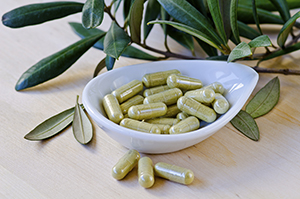The Bible refers to the olive tree as the “tree of life.” Olives, the ripe fruit of the tree, yield healthy monounsaturated fats and phytochemicals that act as potent antioxidants. Research on the benefits of olive oil abounds in scientific literature. Yet, people are still not aware of the amazing healing powers of another component of the olive tree: the leaves.
The olive tree, botanically designated as Olea europaea, brings to us a promising herbal product known as olive leaf extract. The ancient Egyptians regarded the olive leaf as a symbol of heavenly power, and in keeping with that belief, they extracted its oil and used it to mummify their kings. The healing powers of the olive leaf were realized as early as the 1880s when it was utilized to counteract malaria. According to the 1854 Pharmaceutical Journal of Provincial Transactions (pp. 363-354), Hanbury stated that a “decoction of the leaves” of the olive tree had been found to be extremely effective in reducing fevers due to a severe and otherwise often-fatal disease that swept the island of Mytilene in 1843. The olive leaf extract was reported subsequently to be more effective in its fever-lowering properties than quinine. Hanbury recalled that similar observations had been made in France and Spain between 1811 and 1828. It appears that in the early 19th century, Spanish physicians sometimes prescribed olive leaves as a “febrifuge,” and often used them to treat cases of intermittent fever (malaria). Hanbury concluded that the properties of the tree Olea europaea deserved more extensive investigation.
In the early 1900s, scientists isolated a bitter compound called oleuropein from olive leaf that was thought to give the olive tree its disease resistance. In 1962, an Italian researcher recorded that oleuropein had the ability to lower blood pressure in animals. Other European researchers validated that claim and also found it to increase blood flow in the coronary arteries, relieve arrhythmia and prevent intestinal muscle spasms.
In the years to come, a Dutch researcher identified that a primary ingredient in oleuropein inhibited the growth of viruses, bacteria, fungi and parasites. This chemical was elenolic acid. Further European research determined this compound to have strong bactericidal, antiviral and antifungal capabilities. A safety study on calcium elenolate was performed with laboratory animals and published by the Upjohn pharmaceutical company in 1970. The study concluded that, even in doses several hundred times higher than recommended, no toxic or other adverse side effects were discovered.
Upjohn sought to develop a synthetic chemical analogue of elenolate, as a way to tweak this natural molecule into a patentable, profitable antibiotic. But researchers abandoned their quest after it proved impossible to improve on Mother Nature.
Already one of my favorite supplements, new research is confirming the benefits of olive leaf extract. I initially developed a potent version of this supplement for my patients with a view to its infection-fighting capabilities. I have used olive leaf for acne, cystitis, Candida, common respiratory infections and sinusitis with good results. Lately, I’ve become convinced of even broader application of olive leaf to cardiovascular prevention.
It’s long been established that the Mediterranean Diet, rich in unrefined olive oil, confers major cardiovascular benefits. While it’s been thought that the monounsaturated fats in olive oil were responsible, new research suggests that it’s not just the oil itself, but what’s IN the oil that protects the circulatory system.
Good quality, extra-virgin olive oil has a fruity aroma and a greenish tint, the signature for its rich content of beneficial polyphenols like oleoeuropein and hydroxytyrosol.
In a recent study from the University of Auckland in New Zealand, 46 middle-aged, overweight men were supplemented with olive leaf extract or placebo for 12 weeks. Compared with placebo-takers, the olive leaf supplemented men showed a 15% improvement in insulin sensitivity, a marker of blood sugar stability.
They also demonstrated a 28% improvement in their pancreatic responsiveness. The authors conclude: “Supplementation with olive leaf polyphenols for 12 weeks improved insulin sensitivity and pancreatic beta-cell secretory activity in overweight, middle-aged men at risk of developing the metabolic syndrome.”
Other studies have suggested that olive leaf may reduce vascular inflammation and lower blood pressure, additional factors that promote heart disease and stroke. A recent review concludes “beside the antioxidant activity, vasodilatatory, anti-platelet aggregation and anti-inflammatory effects have been assigned to olive oil phenolic compounds such as oleoeuropein and hydroxytyrosol.”
As an added bonus, it has been proposed that olive compounds may possess neuro-protective properties, potentially slowing or reversing deposition of amyloid plaque which is implicated in Alzheimer’s Disease causation.
So, consider adding Olive Leaf Extract to supplements like EPA/DHA, magnesium, resveratrol, curcumin, vitamin D, Aged Garlic Extract, vitamin K2, and EGCG to prevent cardiovascular disease.
Dosage: For health maintenance take one or two 500 mg capsules (20 percent oleuropein) of Olive Leaf Extract twice daily with meals. For the common cold take either two 500 mg capsules, 4 times per day with meals, or one capsule every hour while awake. For long-standing infections, acne, or candida, take two capsules, three to four times per day, with meals.







